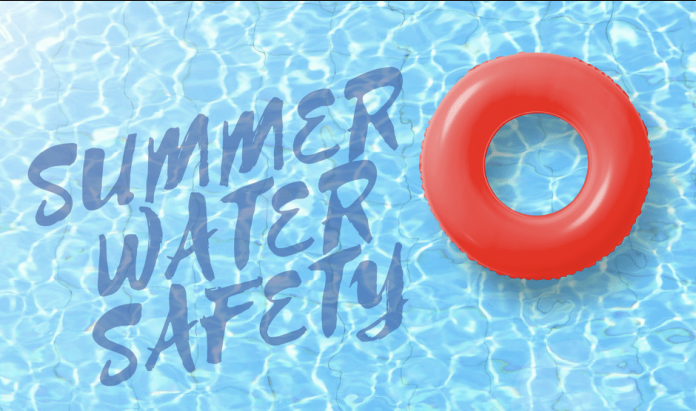 Colonel Eric T. Olson, superintendent of the Missouri State Highway Patrol, is encouraging everyone to incorporate safety into any plans to enjoy Missouri’s waterways. Troopers patrol the state’s waterways to enforce Missouri’s boating laws and assist where needed. Everyone enjoying these areas is asked to do their part!
Colonel Eric T. Olson, superintendent of the Missouri State Highway Patrol, is encouraging everyone to incorporate safety into any plans to enjoy Missouri’s waterways. Troopers patrol the state’s waterways to enforce Missouri’s boating laws and assist where needed. Everyone enjoying these areas is asked to do their part!
Swimming Safety
Wear a life jacket, take a friend with you, know your swimming ability, and stay sober around water. Pay close attention to children around water. Missouri’s lakes and rivers can include currents, drop-offs, and floating debris that make swimming more challenging. Exhaustion is a very real possibility if you’ve been swimming for a long period of time. Don’t make the mistake of overestimating your swimming ability. All swimmers are encouraged to use a life jacket, especially young children and inexperienced swimmers. Younger, inexperienced swimmers may become exhausted before they realize they are in trouble.
Avoid putting yourself at risk when trying to assist someone who is struggling in the water. Assist them by tossing a floatation device or extending an object to them. Keep yourself safe! If you do have to enter the water to assist them, always put on a life jacket first.
Floating Safety
Check the weather and the river level before you go floating. A lot of rain affects the speed of the current and the amount of debris in the water. Know the river conditions before you go. Be aware of changing conditions downstream which may endanger yourself or your group. Consider each person’s level of experience, and base your float plan on the person with the least experience. Pair inexperienced floaters with those who have more experience, and make sure everyone in your group knows your rescue plan.
Bring a life jacket for each person, dry clothing, and a first aid kit. Store extra items in watertight containers. Everyone should use a life jacket, especially those vulnerable to drowning, such as children and adults drinking alcohol.
It takes a lot of energy to navigate a canoe, kayak, or inner tube on a float trip. Packing snacks and beverages to help you refuel is a good idea. Make sure you follow the law for these types of watercraft: Glass beverage containers are not allowed. Ensure coolers are sealed. Collect your trash and take it with you after the float. Leave no trace, so Missouri’s waterways remain beautiful for others.
If you capsize in swift water conditions, hold onto your craft and move immediately to the upstream side to avoid being trapped between the boat and an obstacle. Float on your back, feet together and pointed downstream, and release your craft only if it improves your safety.
Boating Safety
Pay attention to other boats and watercraft, so you can make boating maneuvers early and deliberately when encountering other vessels. Understand that distractions and alcohol consumption slow reaction time. Please designate a sober captain. Drinking alcohol irresponsibly on the water puts you at greater risk of being involved in a boating crash or becoming a drowning victim. Alcohol affects your judgement, reaction time, vision, coordination, and comprehension. It affects you more on the water than on land due to boating stressors. The movement of the boat, vibration and noise from the boat’s motor, sun, and wind are all boating stressors and enhance the effect of alcohol on your body. If alcohol is part of your water activities, drink responsibly: Never operate a vessel if you’ve consumed alcohol.
Many injuries suffered on our lakes during the boating season occur when boats travel across large wakes and the operator or passengers are injured from the impact. Each boater should do their best to reduce the size of their wake and know how to navigate across large wakes. Reducing your speed, approaching the waves at a 45- to 90-degree angle, and keeping the bow of your boat elevated is the safest way to navigate a large wake. Be alert to rough water conditions to protect yourself and your passengers.
Inspect the engine compartment each time you fuel up. Use your engine’s blower system to properly ventilate the compartment for several minutes after fueling up and prior to starting the boat. Gas fumes can result in a fire or explosion if not vented properly.
At night, remember to check your vessel’s navigation lights before heading out, and be sure to have spare bulbs on board. Avoid overloading your boat with too many passengers. This can cause the boat to become swamped and affect the handling of the boat. Observe Missouri’s nighttime speed limit of 30 miles per hour on the water. Slow down and take your time. Nighttime crashes tend to involve more serious injuries and damage.
If you need assistance or witness criminal activity on Missouri’s waterways contact the nearest Highway Patrol troop headquarters by calling the Patrol Emergency Report Line at 1-800-525-5555 or *55 on a cellular phone.
Watercraft operators must consider the effect their actions have on others: Share the waterway and use common sense, good judgment, and courtesy to ensure the safety of all. Life jackets save lives. Wear It!!




Facebook Comments